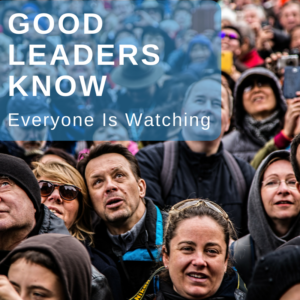 As a leader, you are always being watched. What you say, what you do, your reactions, your comments, your behavior, everything. Inadvertently passing someone without a “hello” or acknowledgment of their existence could be viewed as a slight by the receiver. Even though that was not remotely the intent.
As a leader, you are always being watched. What you say, what you do, your reactions, your comments, your behavior, everything. Inadvertently passing someone without a “hello” or acknowledgment of their existence could be viewed as a slight by the receiver. Even though that was not remotely the intent.
When I’m working with leaders, they are often surprised when I bring this up. In their minds, people should be able to know what they meant or what they were thinking. It’s just common sense, right? It might be common sense, but we can’t be in the minds of the people we meet or work with every day. We don’t know their frame of mind, what fears or doubts they have, what happened before they arrived at work. What would be “common sense” in a neutral setting, might be anything but given the baggage, everyone shows up at the office with.
Good leaders know that it’s up to them as the leader to be aware of and modify their own behavior given the circumstances, not the other way around. Smiles, frowns, jokes, hurriedness, tone of voice, words, etc. are ALL evaluated for what they might mean to the person on the receiving end. And usually, these interpretations are wrong, but they now create a new narrative about what the leader meant or wanted done. Some leaders feel like it’s a sign of strength to “leave them guessing.” It’s not. It’s a sign of a need for control. Some leaders never clean up their messes – intentionally or unintentionally – and either way, it creates chaos in the workplace and ultimately distracts from the goals.
John McCain knew how important this was and when he “messed up” or was wrong, he would always clean it up. He apologized and explained why he did what he did and why he had either changed his mind or clarified what he meant. He always “owned” his thoughts, words, and actions. This is what made him one of the few political leaders that truly had integrity and was respected, no matter which side of the aisle you were on. He wasn’t perfect, but he knew that he was on stage and that everything he did would be interpreted through some lens, so he wanted to make sure it was true to him. He didn’t take credit for others work, he always spoke up when he felt values or behavior were being violated and was respectful of others’ points-of-view. He didn’t make people feel wrong or wronged, he made sure he was heard and that he spent equal time listening to other perspectives.
Great leaders know they are being watched and are aware of the impact of their words, actions and intentions. Make sure that what you meant to convey is what you conveyed and clean it up if you didn’t – humility and humbleness are not a sign of weakness – they are signs of great leadership.
